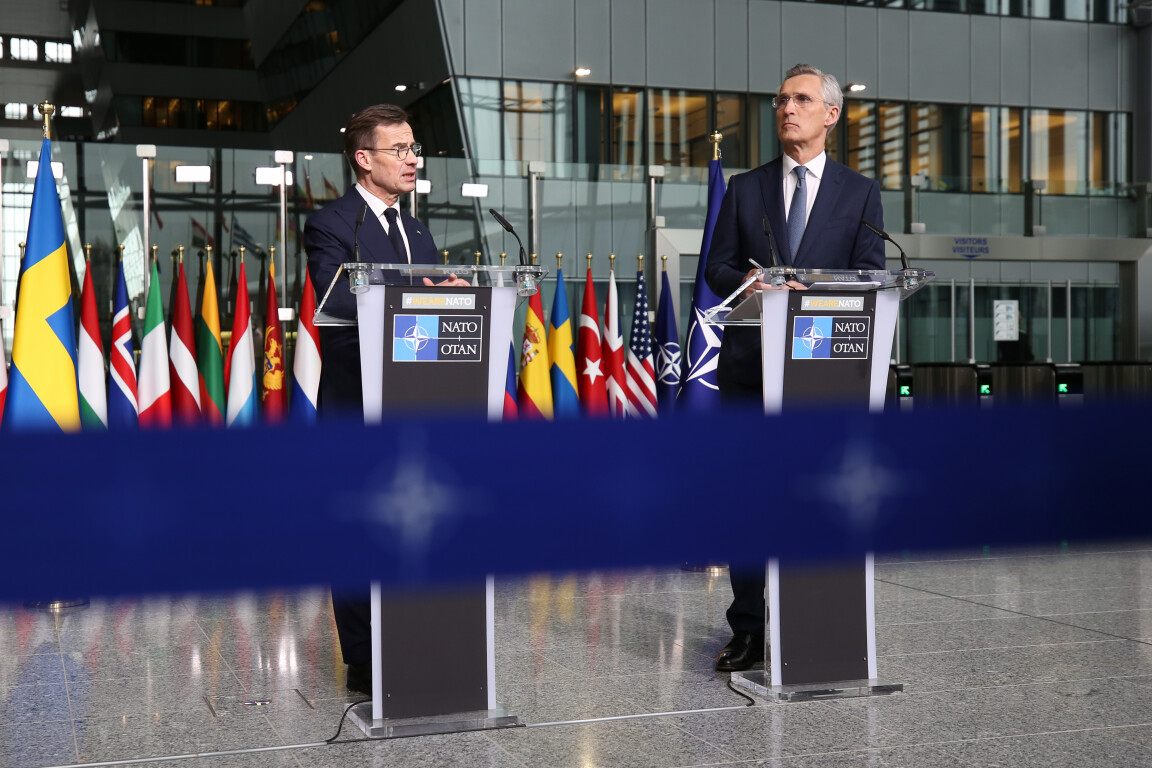
(Photo: Xinhua)
Sweden officially joined the North Atlantic Treaty Organization (NATO) by depositing its instrument of accession with the Government of the United States on March 7, 2024.
Currently, the number of countries in NATO has increased to 32. This move comes just a year after Finland's accession to NATO in April of the previous year, marking another expansion of the alliance within a year.
The Swedish flag was raised at NATO Headquarters for the first time on March 11 in a ceremony to commemorate the country's membership in the Alliance. Standing alongside Prime Minister Ulf Kristersson, Jens Stoltenberg, the Secretary General of NATO, said, "Sweden's membership makes NATO stronger, Sweden safer, and all of us more secure."
Against the backdrop of escalating regional tensions, internal discord within the alliance, and a substantial increase in military expenditure, doubts arise regarding the extent to which Sweden's membership in NATO truly enhances its safety, as declared by the Secretary-General.
Sweden’s bumpy road toward NATO membership
Following the eruption of the Russia-Ukraine conflict in 2022, Finland and Sweden, both Nordic countries in proximity to Russia, expressed mounting concerns over the situation. In response, these nations jointly submitted their applications to join NATO in May 2022. However, following NATO's consensus rule, the admissions require unanimous consent of all existing members.
Finland's decision was influenced by its border with Russia, underscoring the heightened imperative for its security. This prompted Finland to adopt a more proactive and flexible approach during the negotiation process for joining NATO. Following numerous rounds of negotiations and consultations, Turkey, as the final committed ally, expressed a favorable stance towards Finland's accession by the end of March 2023.
In contrast, Sweden's path toward NATO is fraught with significant hurdles. A month following the submission of its application, Turkey, Finland, and Sweden signed a trilateral memorandum to address Turkey’s security concerns, setting the stage for Finland and Sweden's NATO membership.
The memorandum urged swift processing of the expulsion or extradition of terrorist suspects by Sweden and Finland. However, Sweden's actions failed to meet Turkey's expectations, leading Turkey to indefinitely postpone membership talks. Additionally, Hungary's discontent within the ruling Fidesz party over Swedish criticism of the rule of law has further delayed Sweden's application, emerging as the final hurdle to its accession.
Sweden implemented several adjustments aimed at eliciting concessions from opposing members and expediting its entry into the NATO alliance. In April 2023, the Swedish parliament passed legislation that tightened the country’s anti-terrorism laws, with particular emphasis on addressing threats posed by the Kurdistan Workers' Party (PKK), which Turkey is most concerned about.
Sweden's negotiations with Hungary showed signs of speeding up in the accession process at a meeting of prime ministers in February 2024. Both parties announced their agreement on Hungary's acquisition of four new Gripen fighter jets from Sweden, along with extending a related logistics contract and expanding it to training.
According to Swedish Television, the Swedish Government intends to allocate an additional SEK 20 billion to the Armed Forces next year, with an additional SEK 12 billion planned for the following year. This increase is expected to raise the defense budget to approximately SEK 117 billion (equivalent to around 79.8 billion yuan). Sweden's Defense Minister, P l Jonson, said his country would thus meet NATO’s definition of the two percent target for defense spending next year. Sweden has already realigned its diplomatic strategy and increased military investment in anticipation of joining NATO.
Regional tensions and internal conflicts escalate as NATO expands eastwards
Sweden's accession marks NATO's sixth expansion to the east, indicating a strategically advantageous position for the NATO alliance in the Baltic Sea region. NATO's land border with Russia has more than doubled, leaving Russia as the sole non-NATO country bordering the Baltic Sea, which means NATO's military presence has extended to Russia's "doorstep."
The Woodrow Wilson International Center for Scholars (WWICS) highlighted three major benefits of Sweden joining NATO: Sweden's defense industry, the high level of technological competence in Sweden's private sector, and Sweden's air force. Additionally, Sweden's defense industry maintains an export-oriented approach. The International Institute for Strategic Studies (IISS) reports that 58% of Saab's total sales revenue comes from foreign sales. Saab is renowned for its production of military aircraft, defense systems, and related technologies. Sweden's strategic geographical location also positions it as a crucial element in NATO's defense strategies. In response, the Russian Foreign Ministry warned that Russia may need to undertake technical military measures to counter the perceived threat resulting from Finland and Sweden joining NATO.
As NATO started to benefit from the military capabilities of its new allies, internal contradictions became increasingly difficult to conceal. According to Andrew Dorman, a professor of international security at King's College London, Turkey's opposition and, to a degree, Hungary's procrastination on the issue of Sweden's membership, highlights at least one fissure within the NATO alliance: not all NATO members view Russia as the principal security threat.
While NATO is an alliance of states, their individual foreign and defense policies can be significantly influenced by their national interests. Balancing the pursuit of new expansions with the management of internal divisions poses an inevitable dilemma for NATO. Swedish media Expressen reported that during a ceremony outside parliament on March 18, screams, including "No to NATO," disrupted speeches by Prime Minister Ulf Kristersson and King Carl Gustaf. The decision to join NATO is still being questioned, with Kerstin Berge, chairman of the Swedish Peace Association (SPAS), stating that so far they have only seen that the Swedish strategy is to give in to undemocratic demands.
Author | Zhou Jing
















